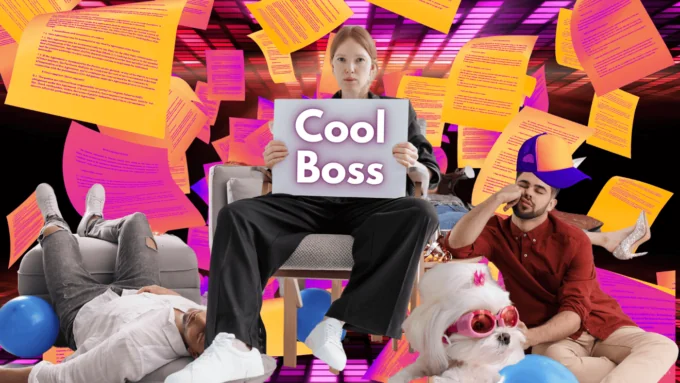Edited By Brandi Neal, Radical Candor podcast writer and producer, and director of content creation…
The Human Cost of NDAs and Forced Arbitration in the Workplace
Edited By Brandi Neal, Radical Candor podcast writer and producer, and director of content creation for Radical Candor. This article about the implications of nondisclosure agreements (NDAs) and forced arbitration in the workplace has been adapted from a Radical Candor podcast episode about the same topic.

In the modern workplace, transparency and accountability should be fundamental values. Yet, many organizations continue to use non-disclosure agreements (NDAs) and forced arbitration clauses as tools to suppress misconduct, silence employees, and ultimately protect those in power.
These legal mechanisms, originally designed for legitimate business protections, have morphed into shields for corporate wrongdoing, creating an imbalance of power that leaves employees vulnerable.
Meta’s recent arbitration case against former employee Sarah Wynn-Williams, whose book Careless People exposes alleged misconduct within the company, has prompted us to explore the broader implications of nondisclosure agreements (NDAs) and forced arbitration in the workplace.
What happens when organizations silence employees instead of removing the obstacles that hinder their success?
Kim Scott, Jason Rosoff, and Amy Sandler explore the systemic issues in workplace culture that lead to silencing employees, companies’ emotional targeting of vulnerable individuals, and the importance of leadership accountability.
The Problem with NDAs and Forced Arbitration
“NDAs are supposed to prevent people from sharing technical secrets—trade secrets,” said Kim Scott, author and co-founder of Radical Candor. “They were not supposed to be used as a way to hide wrongdoing. And yet, that is how they’re being used.”
Scott explores these topics in chapter 7 of her newest book, Radical Respect: How to Work Together Better.
NDAs and non-disparagement agreements often prevent employees from speaking out about workplace abuse, discrimination, or unethical practices.
When paired with forced arbitration—where employees are required to settle disputes in private rather than through the court system—the result is a system that favors corporations over individuals.
“Arbitration is binding, just like going to court,” explained Jason Rosoff, Radical Candor co-founder and CEO. “But the judgment of the arbitrator often favors the employer because the companies pay these arbitrators. They’re not totally neutral.”
While arbitration is often framed as a quicker, less expensive alternative to litigation, in practice, it creates significant obstacles for employees seeking justice. According to Scott, forced arbitration removes critical checks and balances that exist in public legal proceedings.
“We’ve dodged the checks and balances that the government should be putting on the power of any one company or any one wealthy individual,” she said. “It’s a big problem.”
The Real-World Impact on Employees
One of the most insidious aspects of these legal tools is how they discourage employees from speaking up about systemic issues. When employees are forced to sign NDAs or take their grievances to arbitration, companies can continue harmful practices unchecked.
“Institutional betrayal is bad for those who get betrayed,” Scott emphasized, “but it ultimately betrays the institution itself.”
The culture of silence can be particularly damaging in industries where power dynamics are already skewed, such as tech, finance, and media.
It prevents employees from warning others, advocating for change, or even seeking emotional closure from their experiences. Worse, it enables repeat offenders—allowing bad actors to continue mistreating employees without consequences.
Susan Fowler Rigetti, Uber whistleblower and author of Whistleblower: My Unlikely Journey to Silicon Valley and Speaking Out Against Injustice said: “Forcing legal disputes about discrimination, harassment and retaliation to go through secret arbitration proceedings hides the behavior and allows it to become culturally entrenched.”
A Personal Reckoning with NDAs
Scott herself admitted to once using an NDA in a way she now regrets. As a startup founder, she had an employee who planned to sue the company for a hostile work environment. Following legal advice, she offered a settlement in exchange for an NDA.
“Rather than stopping and saying, ‘I should really look at what’s going wrong here,’ I dismissed her claims out of hand, paid her some amount of money, and made her sign an NDA,” Scott recalled. “Power corrupts. Power had corrupted me.”
This moment of reflection highlights a critical point: Even well-intentioned leaders can fall into the trap of using NDAs to avoid addressing deeper workplace issues.
“It’s tempting to silence people, especially if they’re saying something about you and your company that you would rather not be true,” she admitted.
Amy Sandler, principal coach and podcast host at Radical Candor, noted the difficulty many leaders face when navigating these situations, particularly when self-perception and company reputation are at stake.

“Yes, there have been a bunch of times in my career, and I write about many of them in Radical Respect, where I didn’t speak up,” Scott said.
“In retrospect, I wish I had spoken up. Often the reason I didn’t speak up was that there might be a cost to me of speaking up. And I think it’s important to try to decide before you’re in the heat of the moment where your line is, when you’re going to speak up, even if it does cost you something.”
Sandler emphasized the importance of having a support system in place to hold leaders accountable. “It might be interesting to have a buddy in that process,” she suggested, “someone to help you hold yourself accountable.”
You can also do a cost-benefit analysis like Scott details in chapter 9 of Radical Respect.
Be aware that if you sign an NDA as part of a settlement or separation agreement, it will prevent you from helping others at the company by speaking out. Silence has a cost to the person signing the NDA and to anyone in the future who suffers because complaints were covered up.
And some NDAs will prevent you from getting the help you need—they can be so restrictive that you’re forbidden from discussing what happened to you with anyone—even a therapist or a spouse.
Moving Toward a More Transparent Workplace
While some companies have voluntarily ended their use of NDAs for misconduct cases, legislative action is also playing a role. “Increasingly, there’s an acknowledgment that NDAs are used to cover up crimes,” Scott said. “And that’s not acceptable.”
Thanks to advocates like Ifeoma Ozoma, a public policy specialist and technology industry equity advocate who spoke out about the mistreatment and racial discrimination she alleged she had experienced, the Silenced No More Act, passed in California in 2022, prevents employers from enforcing NDAs to cover up workplace harassment and discrimination.
There is ongoing discussion about expanding similar protections nationwide, including the Ending Forced Arbitration Act, passed in 2021. Here are the key differences between the two laws.
H.R. 4445, the Ending Forced Arbitration of Sexual Assault and Sexual Harassment Act of 2021, and California’s Silenced No More Act (SB 331) both aim to protect employees from being silenced about workplace misconduct, but they focus on different legal mechanisms:
H.R. 4445 – Ending Forced Arbitration Act (Federal)
- Scope: Applies nationwide.
- Focus: Prevents forced arbitration in cases of sexual harassment or sexual assault.
- Effect:
- Employees can choose to take their case to court rather than being forced into private arbitration.
- Applies retroactively, meaning employees who signed arbitration agreements before the law’s passage can still sue.
- Does not affect other types of workplace discrimination or harassment claims outside of sexual assault and harassment.
Silenced No More Act (California – SB 331)
- Scope: Applies only in California.
- Focus: Bans non-disclosure agreements (NDAs) that silence workers regarding any form of workplace harassment or discrimination (not just sexual misconduct).
- Effect:
- Employers cannot require NDAs that prevent employees from speaking about discrimination based on race, gender, sexual orientation, age, disability, etc.
- Expands protections from the 2018 California Stand Together Against Non-Disclosures (STAND) Act, which only covered sexual harassment and assault.
- Applies to severance and settlement agreements, meaning employees cannot be forced into confidentiality about workplace misconduct in exchange for a payout.
Forcing legal disputes about discrimination, harassment and retaliation to go through secret arbitration proceedings hides the behavior and allows it to become culturally entrenched.” — Susan Fowler Rigetti
Key Differences
-
Type of Restriction:
- H.R. 4445 blocks forced arbitration.
- Silenced No More Act bans NDAs in settlement and severance agreements.
-
Scope of Protection:
- H.R. 4445 only applies to sexual harassment and assault.
- Silenced No More Act applies to all forms of workplace harassment and discrimination.
-
Jurisdiction:
- H.R. 4445 is a federal law (applies across the U.S.).
- Silenced No More Act is a state law (only applies in California).
Microsoft ended forced arbitration for sexual harassment cases in 2017. Uber followed suit, followed by Google, Facebook, and many others. Despite this, the New York Times reported that Meta, Facebook’s parent company, pursued arbitration, arguing that the book is prohibited under a non-disparagement contract she signed as a global affairs employee.
Rosoff argued that companies should stop seeing transparency as a liability and start recognizing it as a long-term asset. “Right now, the perception is that it’s much more efficient to silence everybody than to actually solve the problem,” he said. “But that’s just not true. It would have been far more efficient to have a system where it was easy to actually have these conversations and address them.”
Instead of relying on NDAs and forced arbitration, organizations should implement robust internal accountability structures. This includes:
- Creating multiple safe channels for employees to report misconduct.
- Establishing independent oversight to review complaints.
- Ensuring that leadership is held accountable for their actions.
As Scott put it, “The cover-up is always worse than the crime. If a company allows a cover-up to go on endlessly, it ultimately becomes a disaster—for employees, for leadership, and for the institution itself.”
Final Thoughts
Eliminating NDAs and forced arbitration in workplace misconduct cases is not just an ethical imperative—it’s a business one. Organizations that prioritize transparency and accountability will build more resilient, trustworthy cultures where employees feel safe to speak up and leaders are incentivized to act with integrity.
Books like She Said by Jodi Kantor & Megan Twohey and Catch and Kill by Ronan Farrow have shown how NDAs enable repeat offenders. If an NDA is necessary, it should protect trade secrets—not silence victims of harassment, discrimination, or abuse.
As Rosoff summed up, “Wouldn’t it be better if we could more consistently meet the needs and expectations of not just our customers and shareholders, but also our employees?”
By rejecting these outdated legal tactics and embracing a culture of openness, companies can truly put their people first—and create a workplace where no one is forced into silence.
Want to learn more? Get Radical Respect wherever books are sold.
- Take the Radical Candor quiz >>
- Sign up for our Radical Candor email newsletter >>
- Listen to the Radical Candor podcast >>
- Shop the Radical Candor store >>
- Get the “Radical” books >>
- Get Radical Candor coaching and consulting for your team >>
- Get Radical Candor coaching and consulting for your company >>
If you understand the importance of receiving feedback in the workplace, then you need The Feedback Loop (think Groundhog Day meets The Office), a 5-episode workplace comedy series starring David Alan Grier that brings to life Radical Candor’s simple framework for navigating candid conversations.
We’re offering Radical Candor readers 10% off the self-paced e-course. Follow this link and enter the promo code FEEDBACK at checkout.






